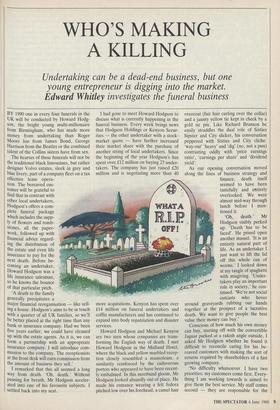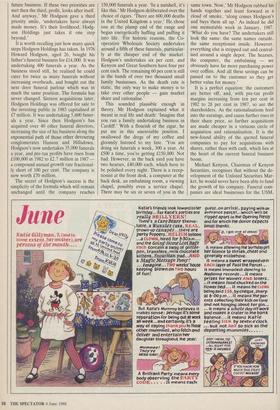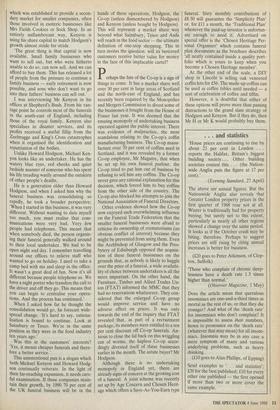WHO'S MAKING A KILLING
Undertaking can be a dead-end business, but one young entrepreneur is digging into the market.
Edward Whitley investigates the funeral business
BY 1990 one in every four funerals in the UK will be conducted by Howard Hodg- son, the bright young multi-millionaire from Birmingham, who has made more money from undertaking than Roger Moore has from James Bond, George Harrison from the Beatles or the combined talent of the Collins sisters have from sex.
'A death in the family generally precipitates a major financial reorganisation — like sell- ing a house. Hodgson's aims to be in touch With a quarter of all UK families, so we'll be better placed at the right time than any bank or insurance company. Had we been five years earlier, we could have cleaned up with the estate agents. As it is, we can form a partnership with an appropriate insurance company. I will introduce com- mission to the company. The receptionists at the front desk will earn commission from the amount of business they sell.'
I remarked that this all seemed a long way from death. 'Oh, death.' Without pausing for breath, Mr Hodgson acceler- ated into one of his favourite subjects. I settled back into my seat. I had gone to meet Howard Hodgson to discuss what is currently happening in the funeral business. Every week brings news that Hodgson Holdings or Kenyon Secur- ities — the other undertaker with a stock- market quote — have further increased their market share with the purchase of another string of local undertakers. Since the beginning of the year Hodgson's has spent over £12 million on buying 23 under- takers. The company has just raised £20 million and is negotiating more than 40 more acquisitions. Kenyon has spent over £14 million on funeral undertakers and coffin manufacturers and has continued to expand into body repatriation and disaster services.
Howard Hodgson and Michael Kenyon are two men whose companies are trans- forming the English way of death. I met Howard Hodgson in the Midland Hotel, where the black and yellow marbled recep- tion closely resembled a mausoleum, a similarity reinforced by the cadaverous porters who appeared to have been recent- ly embalmed. In this moribund gloom, Mr Hodgson looked absurdly out of place. He made his entrance wearing a felt fedora pitched low over his forehead, a camel hair overcoat (fair hair curling over the collar) and a jaunty yellow tie kept in check by a gold tie pin. Like Richard Branson he easily straddles the dual role of Sixties hipster and City slicker, his conversation peppered with Sixties and City cliche: 'way-out' heavy' and 'dig' (no, not a pun) contrasting oddly with 'price earnings ratio', 'earnings per share' and 'dividend yield'.
As along our opening conversation moved the lines of business strategy and finance, death itself seemed to have been tastefully and entirely overlooked. We were almost mid-way through lunch before I men- tioned it.
Conscious of how much his own money can buy, starting off with the convertible Jaguar parked at a rakish angle outside, I asked Mr Hodgson whether he found it difficult to reconcile caring for his be- reaved customers with making the sort of returns required by shareholders of a fast growing company.
'No difficulty whatsoever. I have two priorities: my customers come first. Every- thing I am working towards is aimed to give them the best service. My staff comes second — they are responsible for the future business. If these two priorities are met then the third, profit, looks after itself. And anyway,' Mr Hodgson gave a third priority smile, 'undertakers have always made money. It's their livelihood. Hodg- son Holdings just takes it one step beyond.'
It is worth recalling just how many quick steps Hodgson Holdings has taken. In 1976 Howard Hodgson, aged 26, bought his father's funeral business for £14,000. It was undertaking 400 funerals a year. As the business stood still, he realised he could cater for twice as many funerals without increasing overheads, and bought out the next door funeral parlour which was in much the same position. The formula has never changed. Sixteen acquisitions later, Hodgson Holdings was offered for sale to the investing public in 1983 capitalised at £7 million. It was undertaking 5,600 funer- als a year. Since then Hodgson's has acquired over 40 other funeral directors, increasing the size of his business along the exponential path of those other devouring conglomerates Hanson and Hillsdown. Hodgson's now undertakes 35,000 funerals a year, and pre-tax profits have risen from £100,000 in 1982 to £2.7 million in 1987 — a compound annual growth rate fractional- ly short of 100 per cent. The company is now worth £70 million.
The secret of Hodgson's success is the simplicity of the formula which will remain unchanged until the company reaches 150,000 funerals a year. 'In a nutshell, it's like this.' Mr Hodgson deliberated over the choice of cigars. 'There are 600,000 deaths in the United Kingdom a year.' He chose one at the plump end of the range and began energetically huffing and puffing it into life. 'For historic reasons, the Co- operative Wholesale Society undertakes around a fifth of these funerals, particular- ly at the cheaper end of the market. Hodgson's undertakes six per cent, and Kenyon and Great Southern have four per cent each. The remaining 60 per cent is still in the hands of over two thousand small family businesses. As the death rate is static, the only way to make money is to take over other people — gain market share and rationalise.'
This sounded plausible enough in theory. Mr Hodgson explained what it meant in real life and death: 'Imagine that you run a family undertaking business in Cardiff.' With a flourish of the cigar, he put me in this unenviable position. I swallowed the dregs of my coffee and gloomily listened to my fate. 'You are doing six funerals a week, 300 a year. At £500 a time, you're getting £150,000. Not bad. However, in the back yard you have two hearses, £40,000 each, which have to be polished every night. There is a recep- tionist at the front desk, a computer at the back desk, an embalming room, a viewing chapel, possibly even a service chapel. There may be six or seven of you in the same town. Now,' Mr Hodgson rubbed his hands together and leant forward in a cloud of smoke, 'along comes Hodgson's and buys them all up.' As indeed he did one memorable week in January, 1987. 'What do you have? The undertakers still look the same: the same names outside, the same receptionist inside. However, everything else is stripped out and central- ised around a single depot. The hearses, the computer, the embalming — we obviously have far more purchasing power over coffins. And all these savings can be passed on to the customer so they get better value for money.'
It is a perfect equation: the customers are better off, and, with pre-tax profit margins increasing from ten per cent in 1982 to 28 per cent in 1987, so are the shareholders. As the rationalisations feed into the earnings, and cause further rises in their share price, so further acquisitions are made cheaper in a virtuous circle of acquisition and rationalisation. It is the new-found ability of the quoted funeral companies to pay for acquisitions with shares, rather than with cash, which lies at the heart of the current funeral business boom.
Michael Kenyon, Chairman of Kenyon Securities, recognises that without the de- velopment of the Unlisted Securities Mar- ket, he would never have been able to fund the growth of his company. Funeral com- panies are ideal businesses for the USM, which was established to provide a secon- dary market for smaller companies, often those involved in esoteric businesses like Mrs Fields Cookies or Sock Shop. In an entirely unflamboyant way, Kenyon is using his share capital to match Hodgson's growth almost stride for stride.
'The great thing is that capital is now available. Small family businesses who want to sell out, but who were hitherto unable to do so, can now sell. And we can afford to buy them. This has released a lot of people from the pressure to continue a family business — early retirement is now possible, and sons who don't want to go into their fathers' business can sell out.'
I was interviewing Mr Kenyon in his offices at Shepherd's Bush. From his van- tage point he controls most of the funerals in the south-east of England, including those of the royal family. Kenyon also specialises in disaster services, and its profits received a useful fillip from the Zeebrugge and King's Cross catastrophes When it organised the identification and repatriation of the bodies.
Unlike Howard Hodgson, Michael Ken- yon looks like an undertaker. He has the watery blue eyes, red cheeks and quiet bedside manner of someone who has spent his life treading warily around the outskirts of other people's deaths.
He is a generation older than Howard Hodgson, and when I asked him why the funeral business was consolidating so rapidly, he took a broader perspective: 'When I started in this business, it was very different. Without wanting to date myself too much, you must realise that com- munications were very bad. Very few people had telephones. This meant that when somebody died, the person organis- ing their funeral generally walked around to their local undertaker. We had to be open night and day. I remember travelling around our offices to relieve staff who wanted to go on holiday. I used to take a camp bed with me and sleep in the office. It wasn't a great deal of fun. Now it's all different because people telephone us. We have a night porter who transfers the call to the driver and off they go. This means that you can begin to centralise your opera- tions. And the process has continued.' When I asked how far he thought the consolidation would go, he forecast wide- spread change. 'It's hard to say, rationa- lisation is bound to continue. Look at Sainsbury or Tesco. We're in the same Position as they were in the food industry ten years ago.'
Was this in the customers' interests? 'Yes, it means cheaper funerals and there- fore a better service.'
This unintentional pun is a slogan which both Michael Kenyon and Howard Hodg- son continually reiterate. In the light of their far-reaching expansion, it needs care- fill examination. If these companies main- tain their growth, by 1990 70 per cent of the UK funeral business will be in the hands of three operations, Hodgson, the Co-op (unless dismembered by Hodgson) and Kenyon (unless bought by Hodgson). This will represent a market share way beyond what Sainsbury, Tesco and Asda will reach in the food sector — the ultimate definition of one-stop shopping. This in turn invites the question: will its bereaved customers receive better value for money in the face of this implacable cartel?
Perhaps the fate of the Co-op is a sign of things to come. It has a market share well over 30 per cent in large areas of Scotland and the north-east of England, and has recently been required by the Monopolies and Mergers Commission to divest some of the businesses it bought from the House of Fraser last year. It was deemed that the ensuing monopoly of undertaking business operated against the public interest. There was evidence of malpractice, the most scandalous relating to the Co-op's coffin manufacturing business. The Co-op manu- facture over 70 per cent of coffins used in Scotland, and it was revealed by a former Co-op employee, Mr Maguire, that when he set up his own funeral parlour, the Co-op tried to put him out of business by refusing to sell him any coffins. The Co-op never gave any rational explanation for this decision, which forced him to buy coffins from the other side of the country. The Co-op also blocked his attempts to join the National Association of Funeral Directors.
Other evidence showed how the Co-op now enjoyed such overwhelming influence on the Funeral Trade Federation that the smaller funeral businesses were afraid to criticise its ownership of crematoriums (an obvious conflict of interest) because they might be prevented from using them. Even the Archbishop of Glasgow and the Pres- bytery of Edinburgh opposed the acquisi- tion of these funeral businesses on the grounds that, as nobody is likely to haggle over the price of a funeral, a wide availabi- lity of choice between undertakers is all the more important. On the other hand, the Furniture, Timber and Allied Trades Un- ion (FTAT) informed the MMC that they had no reservations whatsoever. They con- sidered that the enlarged Co-op group would improve service and have no adverse effect on prices. It was only towards the end of the inquiry that FTAT revealed that, as part of a recruitment package, its members were entitled to a ten per cent discount off Co-op funerals. An- xious to close the lid back on this wriggling can of worms, the hapless Co-op accor- dingly divested itself of these businesses earlier in the month. The astute buyer? Mr Hodgson. Although there is no undertaking monopoly in England yet, there are already signs of concern at the growing cost of a funeral. A joint scheme was recently set up by Age Concern and Chosen Herit- age which offers a Save-As-You-Earn type funeral. Sixty monthly contributions of £8.50 will guarantee the 'Simplicity Plan' or, for £11 a month, the 'Traditional Plan' whenever the paid-up investor is unfortun- ate enough to need it. Advertised on special offer is the 'Chosen Heritage Per- sonal Organiser' which contains funeral plan documents as the brochure describes 'all neatly contained inside a quality port- folio which is yours to keep when you become a Chosen Heritage member'.
At the other end of the scale, a DIY shop in Lincoln is selling oak veneered coffin kits for £56. The made-up coffins can be used as coffee tables until needed — a sort of celebration of coffee and tiffin.
However, it is doubtful that either of these options will prove more than passing distractions to the grand slam strategy of Hodgson and Kenyon. But if they do, then Mr H or Mr K would probably buy them.




















































 Previous page
Previous page